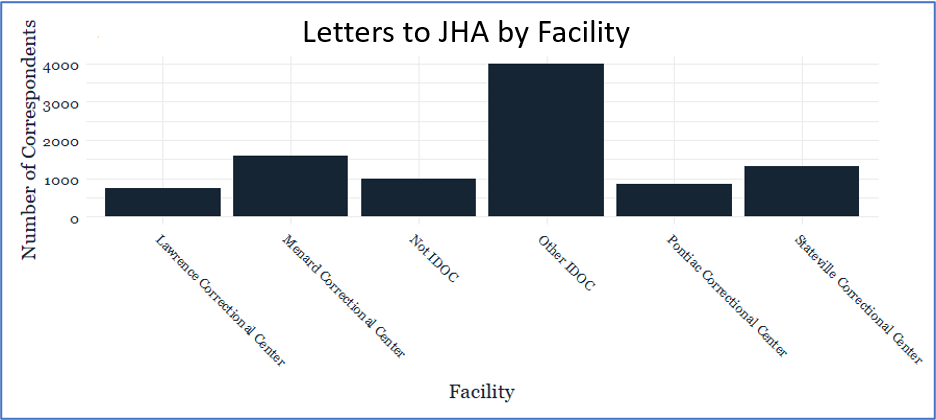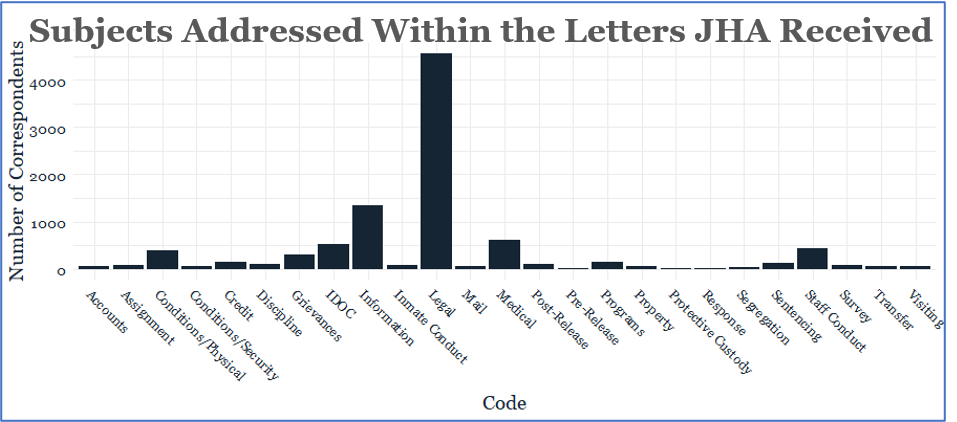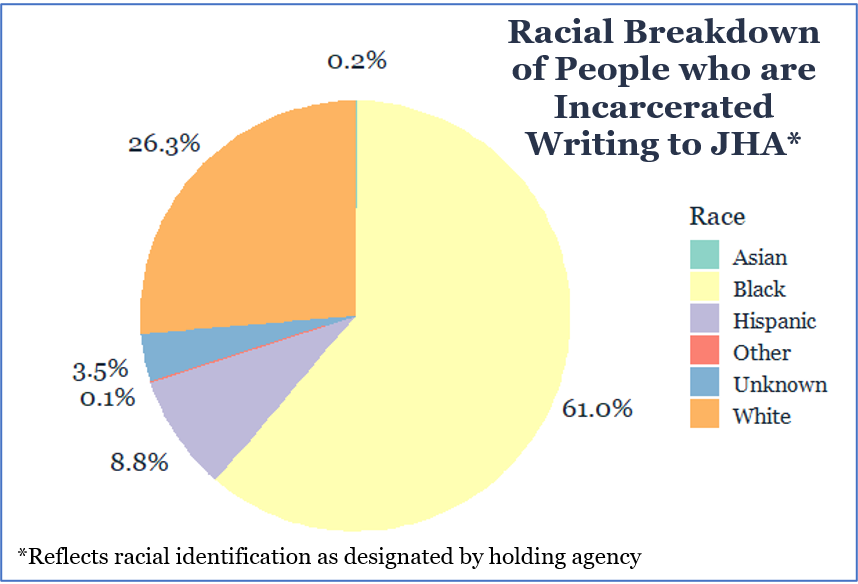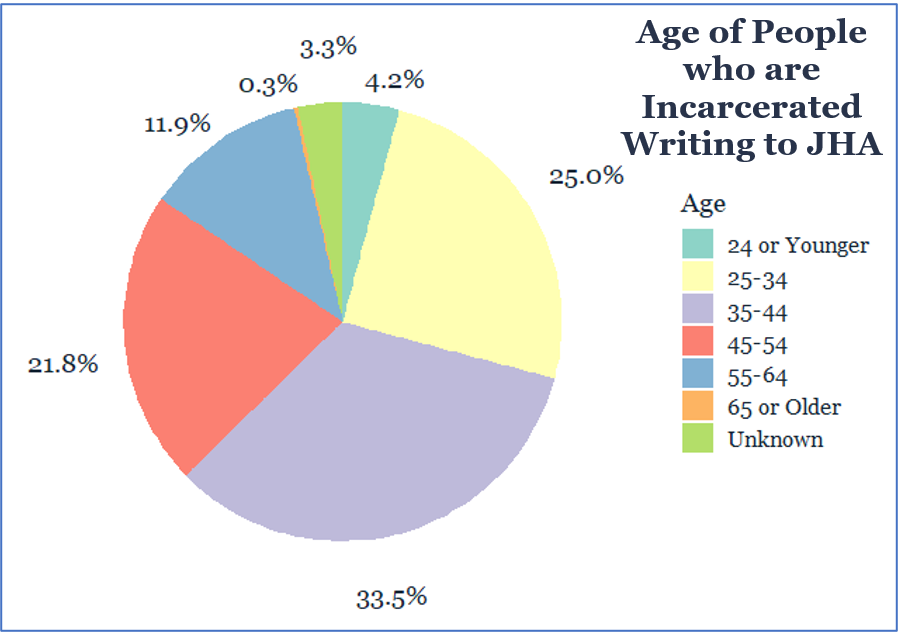Prison Communications 2019
The following provides data on the letters from prisoners received and responded to by JHA during the 2019 calendar year.
John Howard Association’s Prison Response Unit (PRU) provided information to prisoners who are often cut off from obtaining materials and data from reliable sources. As articulated in Illinois’ Administrative Code, individuals incarcerated in Illinois may send privileged mail to JHA. (“Privileged mail” simply means that mail marked as such can be sent to or from a prison or jail in Illinois in a sealed envelope and is not supposed to be read by correctional staff. “Privileged mail” does not mean it is a legal communication; correspondence between an attorney and their client is “legal mail.”) This allows people who are incarcerated to communicate with JHA confidentially.
The information services we provided covered a wide range of criminal justice issues, including correctional policies and procedures, statutes, court decisions, legal forms, and information related to litigation. We also provided printouts of JHA-created materials including reports, survey results, and information packets on various subjects we are routinely asked about. Beyond responding to the specific questions, we use what people share about issues to inform our monitoring and advocacy work.
“By no means are we afforded an adequate opportunity to study the law and defend ourselves. Deadlines in the court system are unyielding. We perpetually go on lockdown in the maximum-security system. We feel as though we are fighting a losing battle. The court presents as a formidable opponent for those who are well prepared and have private attorneys. Imagine how that leaves us.” - someone incarcerated in IDOC
In 2015, given an increase in mail we received and complaints about access to law libraries, which we also heard about during our visits and supported by observations, JHA’s PRU began filling service gaps by mailing legal materials to prisoners upon request, information that they should have been able to access through facility law libraries. Over the last four years the number of requests for legal materials JHA received quadrupled. The people who write to us regularly express that if not for JHA, they would not have been able to obtain these materials. Some IDOC staff even began to refer people to JHA knowing that we could fulfill people’s research needs in a more expedient manner than the facility law library.
JHA recognizes the importance of people having access to the legal materials they need to mount effective criminal appeals and challenge unconstitutional conditions of confinement in the courts, which is why we have done our best with the few resources and limited volunteer network we have to help. However, JHA is not resourced (and never has been) to meet this demand. Until July 2019, we continued to provide any publicly-available, legal-related documents requested in order to meet prisoners’ needs and help them secure their rights; however, due to lack of funds, we unfortunately had to cease providing this service.
Today, people who are incarcerated can send privileged mail to JHA in order to report an issue or problem, or to let us know what is going on behind prison walls. The information shared with us in letters from people who are incarcerated guides and is critically important to our monitoring work and advocacy efforts.
2019 prison response data by the numbers
5,019 letters received from 2,327 individuals who were housed in a prison or jail (The number of letters received and responded to in 2019 is down slightly from the previous year, reflecting JHA’s shift in ability to provide caselaw as of July 2019.)
766 calls and emails received from people in the community with concerns and questions
More than 75 volunteers donated 1,657 hours of their time reading, answering and tracking letters
The following data is a summary of the correspondence from people who are incarcerated answered by JHA during the 2019 calendar year:
The PRU mainly provides services to prisoners held by IDOC. However, JHA also responds to people held by other law enforcement entities located throughout the United States. This is reflected by the “Not IDOC” category in the graph above, which includes facilities such as county jails, federal facilities, or facilities in other states. The “Other IDOC” category is composed of all IDOC facilities other than the four most frequently heard from IDOC facilities in 2019 (Menard, Stateville, Pontiac and Lawrence).
The PRU mainly provides services to prisoners held by IDOC. However, JHA also responds to prisoners held by other law enforcement entities located throughout the United States. This is reflected by the “Not IDOC” category in the graph above, which includes facilities such as county jails, federal facilities, or facilities in other states. The “Other IDOC” category is composed of all IDOC facilities other than the four most frequently heard from IDOC facilities in 2018 (Menard, Pontiac, Stateville, and Western), which were also the most frequently heard from in 2017.
JHA codes letters by issues raised or the type of information requested by prisoners. A single letter may raise multiple issues or contain requests for several types of information; thus, the total numbers in the chart above exceed the number of letters processed. The top three codes for 2019 in the 5,019 letters, were Legal, Information, and Medical-related issues and questions, with IDOC Information and Staff Conduct coming in closely behind. Please see the glossary at the end of this report for more detailed definitions of categories.
Demographic Characteristics of People who are Incarcerated
that Wrote to JHA in 2019
Race: The racial breakdown of prisoners that wrote JHA in 2019 is representative of the racial breakdown of IDOC’s population
Age: According to IDOC, the average age of prisoners is 39. As the graph above indicates, fewer people older than 44 write JHA in comparison to people who are 44 or younger.
Gender: We receive fewer letters from female prisoners. Approximately 11% of the letters we receive are from females, while 6% of IDOC’s population is female. This reflects an increase in 2019 in number of females writing JHA over past years.
Reports by family, friends and people in the community
The majority of the questions and issues reported to JHA in 2019 by family, friends, and people in the community related to the following subjects:
Communication and contact (telephone, visitation, mail)
Transfers to different different/closer facilities
Sentencing credit, prisoners’ rights and statutory interpretation
Legal representation or referrals
Poor conditions (temperature, food, water, unmet medical needs, safety, treatment by others)
Code Glossary
Accounts: Commissary, Co-pay, Phone, Trust Account, Inmate Benefit Fund, State Pay, Indigent Status, GTL
Assignment: Cell Assignment, Job Assignment, Classification, STG Designation
Conditions-Physical: Clothing, Facilities, Food, Hygiene Supplies, Overcrowding, Sanitation, Temperature, Water, Ventilation, ADA accessibility, etc.
Conditions-Security: Lockdowns, Security Related Operations, Searches, Cell Extraction, Out of Cell time, etc.
Credit: All forms of sentencing credit this is awarded or revoked by IDOC
Discipline: Issues related to inmate disciplinary process
Grievance: Issues related to the process by which people imprisoned attempt to have problems resolved by correction officials
Inmate Conduct: Complaints from one inmate about another inmate(s)
IDOC-Information: IDOC Rules, Department data, IDOC reports, etc.
Information: Requests for a wide range of materials, including JHA reports, articles, resource guides, etc.
Information Access: Barriers to accessing the law library
Legal: Requests for printouts of court decisions and statutes, legal information, legal forms, etc.
Mail: Issues related to mail delivery to and from prisons/jails
Medical: Complaints as to quality of care received or lack of care
Post-Release: Door violators, host site approval, Mandatory Supervised Release (MSR, or parole) violations, MSR conditions, Employment, Housing, etc.
Pre-Release: Adult Transition Centers (work release), Electronic Detention, etc.
Programs: Educational programs, lack of educational programs, treatment programs, etc.
Protective Custody: Inmate requests to be specially housed and concerns related to protective custody practices
Segregation: Administrative detention, privileges/lack of privileges while housed in disciplinary unit, etc.
Sentencing: Questions and concerns related to how an inmate’s sentence is being calculated, and how IDOC is classifying his/her offense
Staff Conduct: Complaints as to staff not following rules and disagreements with staff implementation of discretionary authority
Surveys: Submission of JHA survey form by mail, questions about survey.
Transfer: Requests from inmates to be transferred to another prison, have security classification reduced, serve MSR term out of state, etc.
Visiting: Issues related to prison visiting rooms and restrictions, plus telephone contact
